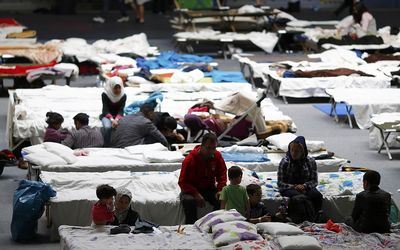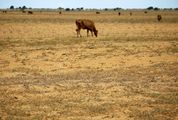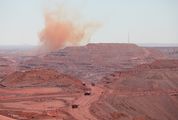Europe’s chickens come home to roost
by Bryan Rostron,
2015-10-12 06:14:08.0
IT IS fashionable to talk up the glories of the British Empire, ignoring its rapacity and violence. Historians invoke Pax Britannica, although during Queen Victoria’s 63-year reign there were at least 60 conflicts somewhere on the map that was being painted red.
With the influx of refugees and migrants, Europe is now reaping what it sowed, not least from the Sykes-Picot accord of less than a century ago. This secret pact of 1916 agreed to carve up "spheres of influence" in the Middle East between the UK and France after the First World War — chiefly in Palestine, Jordan, Iraq, Syria and Lebanon.
While most European leaders, particularly in the UK and France, suffer from acute amnesia, the makers of Empire generally practised less self-deception.
For the UK to remain a great empire, Queen Victoria instructed her prime minister, Benjamin Disraeli, to: "Be prepared for attacks and wars, somewhere or other continually." She also regularly received plunder as an imperial tribute on the defeat of another distant enemy.
This brusque reality is evident on old maps. Among my father’s possessions that I found after his death is a frayed, faded old chart presented to him at the 1932 Olympic Games. It was rolled inside a certificate recording that he had served on the Olympic boxing jury.
The chart has sketches of several "Atlantic and Ethiopic Ocean" islands, and presumably the Olympic committee thought this would be a fitting gift for my father because at the bottom is an inset with a diagram of Table Bay and "Robin Island".
In fact, the chart had been removed from Emanuel Bowen’s Complete Atlas of 1752. Bowen, Geographer Royal to George III, produced several maps of Africa that purged the exotic motifs that filled blank spaces on previous maps, replacing them with comments such as "man eaters" or "savage people".
It is framed on my wall next to a larger map published 30 years later, entitled "Africa, agreeable to the most approved maps and charts, by Mr Kitchen". Thomas Kitchen served as hydrographer to George III. Apart from an ornate cartouche with a bare-breasted nymph flanked by a lion and camel, the map still has vast blanks in the interior.
Much of North Africa is merely identified as "Desert of Barbary" or "Negroland". Central Africa is shown as a white expanse with names like "Mujak" and "Zendero", stuck in the middle of what appears to be an empty vastness. This is what was usually identified on other contemporary maps as terra incognita — a short mental step to the idea of terra nullius, or no one’s land.
Almost a century before, philosopher John Locke had given intellectual justification for the appropriation of terra nullius by arguing that ownership derived from labour. Locke, regarded as a founder of classic English liberalism, argued that "land left wholly to nature, that hath no improvement of pasturage, tillage, or planting, is called, as it is indeed, ‘waste’…". Thus, possession, he wrote, must devolve to he who "mixed his labour, and joined it to something that is his own".
On my Kitchen map, along the indented curve of West Africa, a string of names shows the interests of competing European powers: Grain Coast, Ivory Coast, Gold Coast and Slave Coast. Much of the British Empire, a fact largely forgotten, was run by private enterprise. Foremost was the British East India Company, with its own army and notoriously corrupt officials.
In Africa, there were the Guinea Company, the Royal Niger Company, the Imperial British East Africa Company and Cecil Rhodes’s British South Africa Company. This resulted in a convenient audit of national glory and private profit.
The candid words of Queen Victoria’s last and longest-serving prime minister should be etched in huge letters at every British port of entry. "If our ancestor had cared for the rights of other people," said Lord Salisbury, "the British empire would not have been made."
• Rostron is a journalist and author

Migrants rest at a temporary shelter in a sports hall in Hanau, Germany, on Thursday. Picture: REUTERS/KAI PFAFFENBACH
IT IS fashionable to talk up the glories of the British Empire, ignoring its rapacity and violence. Historians invoke Pax Britannica, although during Queen Victoria’s 63-year reign there were at least 60 conflicts somewhere on the map that was being painted red.
With the influx of refugees and migrants, Europe is now reaping what it sowed, not least from the Sykes-Picot accord of less than a century ago. This secret pact of 1916 agreed to carve up "spheres of influence" in the Middle East between the UK and France after the First World War — chiefly in Palestine, Jordan, Iraq, Syria and Lebanon.
While most European leaders, particularly in the UK and France, suffer from acute amnesia, the makers of Empire generally practised less self-deception.
For the UK to remain a great empire, Queen Victoria instructed her prime minister, Benjamin Disraeli, to: "Be prepared for attacks and wars, somewhere or other continually." She also regularly received plunder as an imperial tribute on the defeat of another distant enemy.
This brusque reality is evident on old maps. Among my father’s possessions that I found after his death is a frayed, faded old chart presented to him at the 1932 Olympic Games. It was rolled inside a certificate recording that he had served on the Olympic boxing jury.
The chart has sketches of several "Atlantic and Ethiopic Ocean" islands, and presumably the Olympic committee thought this would be a fitting gift for my father because at the bottom is an inset with a diagram of Table Bay and "Robin Island".
In fact, the chart had been removed from Emanuel Bowen’s Complete Atlas of 1752. Bowen, Geographer Royal to George III, produced several maps of Africa that purged the exotic motifs that filled blank spaces on previous maps, replacing them with comments such as "man eaters" or "savage people".
It is framed on my wall next to a larger map published 30 years later, entitled "Africa, agreeable to the most approved maps and charts, by Mr Kitchen". Thomas Kitchen served as hydrographer to George III. Apart from an ornate cartouche with a bare-breasted nymph flanked by a lion and camel, the map still has vast blanks in the interior.
Much of North Africa is merely identified as "Desert of Barbary" or "Negroland". Central Africa is shown as a white expanse with names like "Mujak" and "Zendero", stuck in the middle of what appears to be an empty vastness. This is what was usually identified on other contemporary maps as terra incognita — a short mental step to the idea of terra nullius, or no one’s land.
Almost a century before, philosopher John Locke had given intellectual justification for the appropriation of terra nullius by arguing that ownership derived from labour. Locke, regarded as a founder of classic English liberalism, argued that "land left wholly to nature, that hath no improvement of pasturage, tillage, or planting, is called, as it is indeed, ‘waste’…". Thus, possession, he wrote, must devolve to he who "mixed his labour, and joined it to something that is his own".
On my Kitchen map, along the indented curve of West Africa, a string of names shows the interests of competing European powers: Grain Coast, Ivory Coast, Gold Coast and Slave Coast. Much of the British Empire, a fact largely forgotten, was run by private enterprise. Foremost was the British East India Company, with its own army and notoriously corrupt officials.
In Africa, there were the Guinea Company, the Royal Niger Company, the Imperial British East Africa Company and Cecil Rhodes’s British South Africa Company. This resulted in a convenient audit of national glory and private profit.
The candid words of Queen Victoria’s last and longest-serving prime minister should be etched in huge letters at every British port of entry. "If our ancestor had cared for the rights of other people," said Lord Salisbury, "the British empire would not have been made."
• Rostron is a journalist and author



























Change: 0.90%
Change: 0.73%
Change: 2.97%
Change: 0.96%
Change: -1.95%
Data supplied by Profile Data
Change: 0.00%
Change: 0.00%
Change: 0.90%
Change: 0.00%
Change: 0.00%
Data supplied by Profile Data
Change: 0.03%
Change: 0.01%
Change: -0.01%
Change: 0.00%
Change: -0.58%
Data supplied by Profile Data
Change: 0.00%
Change: 0.00%
Change: 0.00%
Change: 0.00%
Change: 0.00%
Data supplied by Profile Data